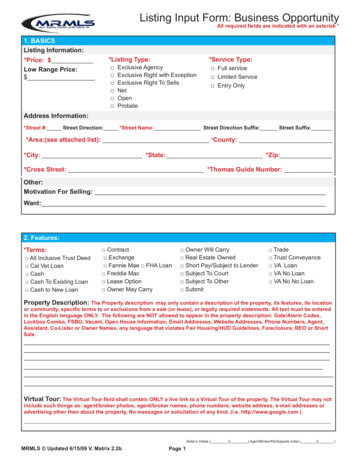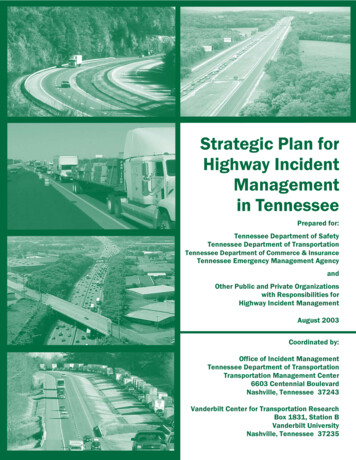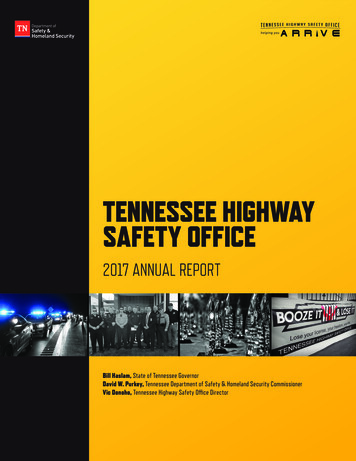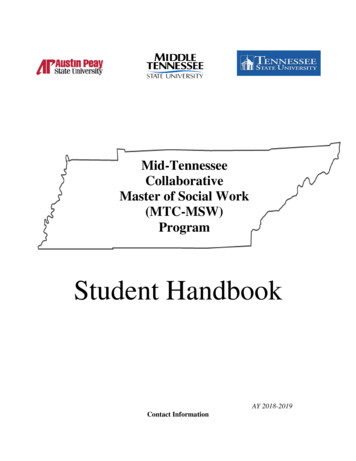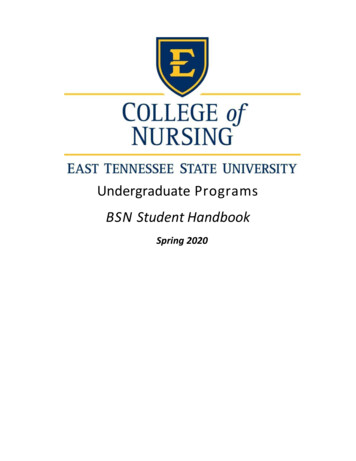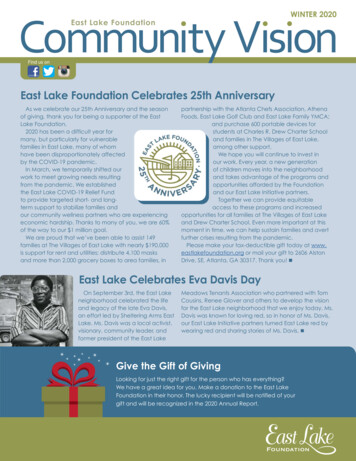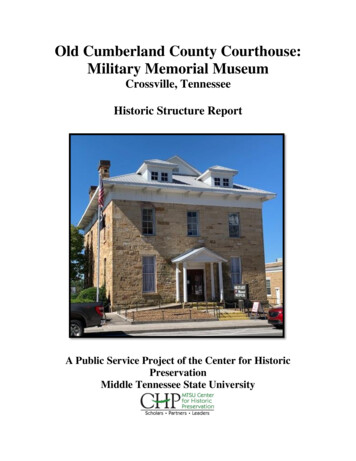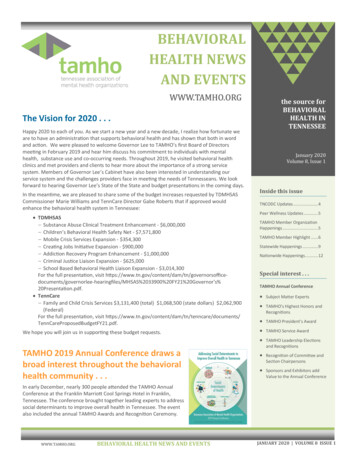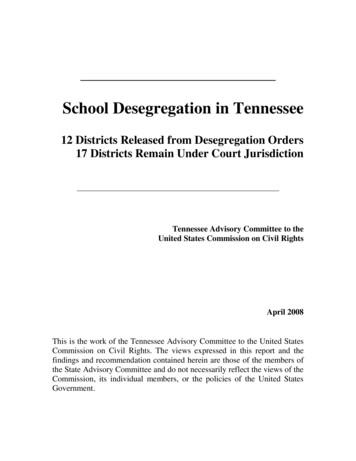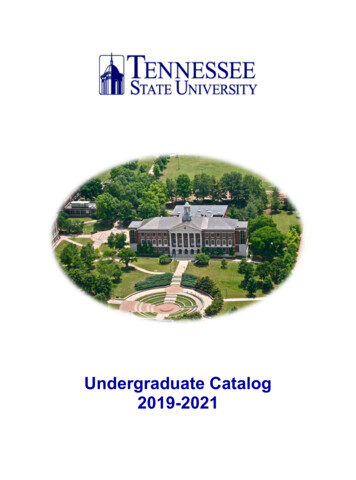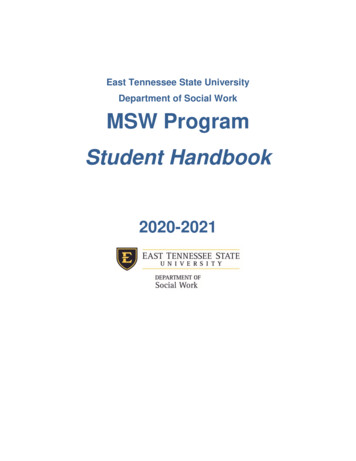
Transcription
East Tennessee State UniversityDepartment of Social WorkMSW ProgramStudent Handbook2020-2021
MSW Program Student Handbook 2020-2021Table of ContentsWelcome from the MSW Program Director . 4Administration and Staff Contact Information . 5Faculty/Staff Contact Information . 5MSW Program Overview. 6Mission and Goals . 6MSW Program Goals . 7MSW Program Curriculum Overview . 8Traditional and Advanced Standing Curricular Options. 8Field Education. 8Field Seminars and Faculty Field Liaisons . 9Field Instructors . 9Programs of Study . 10Part-time Degree Plan. 10Distance Education . 10Locations . 11Course Descriptions . 12Foundation Courses . 12Specialized Practice Courses . 13MSW Program Policies and Procedures. 14Retention in the MSW Program . 14Criteria for Student Evaluation . 14Academic Performance . 15Grades . 16Academic Performance Review . 17Criteria for Student Dismissal . 19Leave of Absence . 19Withdrawal from the University . 19Transfer of Credit Hours . 20Transfer of Credit Hours from Non-MSW Graduate Programs. 20Transfer of Credit Hours from a CSWE Accredited MSW Program . 212
MSW Program Student Handbook 2020-2021Transfer from one campus to another within the Department of Social Work . 22Life Experience . 22Waiver by Examination . 22Academic Advisement Policy and Procedures . 23Responsibility Shared . 23Student Advisement. 23Student Appeal Procedures . 24Grade Appeal Process . 24Basis for Appeal. 24Appeal to the Faculty Member for Review of the Assigned Grade . 25Appeal to the MSW Program Director . 25Appeal to the Dean of Graduate Studies . 26Student Conduct and Rights; Complaint Policy and Procedure for Students . 26The Honor Code of the University . 27Other Graduate School Policies . 27Graduation Information . 27Culminating Experience . 28Hooding Ceremony . Error! Bookmark not defined.Social Work Clubs and Organizations . 29Master of Social Work Student Association. 29Phi Alpha Honor Society. 29Campus Resources and Services . 30Professional Social Work Resources . 30While we strive to keep information in this handbook current, all material is subject toupdates (revised 8/2020). All revisions to the MSW Student Handbook during therespective academic year are applicable for fall, spring, and summer sessions.3
Welcome from the MSW Program DirectorDear MSW Student,On behalf of the faculty and staff, I welcome you to the Master of Social Work (MSW)Program at East Tennessee State University. Housed in the historic Lyle House, theMSW Program is fully and unconditionally accredited by the Council on Social WorkEducation.This handbook is intended as a supplement to the University Graduate Catalog https://www.etsu.edu/reg/catalog/. This handbook provides information about MSWProgram requirements and provides answers to frequently asked questions. Facultyadvisors are happy to assist students with any needed clarification of the material in thishandbook and provide answers to questions not contained in it.Please refer to this handbook often while enrolled in the MSW Program. I wish you wellin your academic studies, and feel free to contact me with your questions.Sincerely,Brittany Wilkins, Ph.D., L.C.S.W.MSW Program DirectorAssociate ProfessorDepartment of Social WorkCollege of Clinical and Rehabilitative Health Sciences
MSW Program Student Handbook 2020-2021Administration and Staff Contact InformationMary Mullins, Ph.D., M.S.W.Department Chair and Associate ProfessorOffice: (423) 439-6013E-mail: mullinsmh@etsu.eduBrittany Wilkins, Ph.D., L.C.S.W.Director, MSW Program and Associate ProfessorOffice: (423) 439-7894E-mail: wilkinsb@etsu.eduVACANTDirector, MSW Field EducationOffice:E-mail:E. Philip StorkMSW Executive AideOffice: (423) 439-6013E-mail: storke@etsu.eduFaculty/Staff Contact InformationFor a current and full listing of faculty and staff in the Department of Social Work, pleasevisit - https://www.etsu.edu/crhs/socialwork/faculty staff/5
MSW Program Student Handbook 2020-2021MSW Program OverviewThe mission and goals of the East Tennessee State University (ETSU) Master ofSocial Work (MSW) Program remain focused on delivery of a clinical curriculum, as hasbeen the case since the inception of the program. The program definition of “clinicalpractice” is defined as a model of practice that involves those activities with and onbehalf of clients, especially those activities completed in the client's presence and withthe client's collaboration. These activities are informed by an ecologically basedbiopsychosocial assessment. These interventive and change oriented activities arebased on a range of theories with the clinical social worker selecting the one mostappropriate for the client's situation. These activities may take place in an individual,family, or group setting. While focusing on those activities done in direct contact withclients, clinical social workers must also be prepared to make indirect contacts on behalfof clients. Those contact functions include advocacy, consultation, referral, andsupervision. All social workers, including clinical social workers, must be aware of theimpact of social policies upon their clients, and as citizens knowledgeably engage in thedemocratic process in common struggle for economic and social justice.Mission and GoalsThe East Tennessee State University Department of Social Work MSW Programis committed to excellence in evidence informed education and professional preparationof clinical social workers who treat all people with dignity and respect and who, utilizinga person-in-environment framework and global perspective, facilitate attainment ofoptimal social, economic, health, and environmental conditions for clients and theircommunities, especially in Southern Appalachia.The mission and goals of the program are integrated with the competencies defined bythe Council on Social Work Education (CSWE) Educational Policies and AccreditationStandards:Competency 1: Demonstrate Ethical and Professional BehaviorCompetency 2: Engage Diversity and Difference in Practice6
MSW Program Student Handbook 2020-2021Competency 3: Advance Human Rights and Social, Economic, and EnvironmentalJusticeCompetency 4: Engage In Practice-informed Research and Research-informedPracticeCompetency 5: Engage in Policy PracticeCompetency 6: Engage with Individuals, Families, Groups, Organizations, andCommunitiesCompetency 7: Assess Individuals, Families, Groups, Organizations, andCommunitiesCompetency 8: Intervene with Individuals, Families, Groups, Organizations, andCommunitiesCompetency 9: Evaluate Practice with Individuals, Families, Groups, Organizations,and CommunitiesMSW Program GoalsGoal 1: To prepare students with the knowledge, values, and skills of clinical practice.Goal 2: To prepare students to engage in competent and responsible clinical practicewithin public and private agencies.Goal 3: To prepare students to develop and use ethical research in the advancementand enhancement of social work practice.Goal 4: To provide service at the university, local, state, regional, national, and globallevels.Goal 5: To increase the availability of skilled advanced practice social workprofessionals in this region.The Master of Social Work Program at ETSU has two entrance points – entrance viathe traditional program of study (63 credit hours) and entrance via the advancedstanding program of study (37 credit hours). Those students starting through thetraditional entrance point begin with foundation courses. The foundation curriculum isdesigned to orient and socialize students to the profession of social work and to preparethem with a generalist perspective for working with all levels of client systems. After the7
MSW Program Student Handbook 2020-2021foundation courses, focus shifts to a clinical specialized practice curriculum, chosen bythe Department of Social Work in collaboration with ETSU Administration, communityagencies, and consulting social work professionals. Admission into the AdvancedStanding Program requires a Bachelor of Social Work (BSW) degree from a CSWEaccredited program awarded subsequent to 1984. Once admitted, advanced standingstudents begin the clinical concentration curriculum after completing thePsychopathology course.MSW Program Curriculum OverviewTraditional and Advanced Standing Curricular OptionsThe MSW Program offers two curricular options to students enrolled, the“Traditional” and the “Advanced Standing.” Both program of study options require thatstudents meet the identical concentration requirements; students in the AdvancedStanding option take three elective course requirements. (The Advanced StandingCurriculum is composed of the Specialized Practice Curriculum preceded by thePsychopathology course which is provided to facilitate student transition into advancedgraduate study.) The specialized practice curriculum is designed to provide studentswith advanced content in clinical practice (as defined elsewhere in this handbook). Incontrast, the Foundation curriculum of the Traditional option is designed to providestudents with the opportunity to acquire the knowledge, skills, and ethical appreciationessential to “generalist” social work practice, which is also the central focus of BSWPrograms. In brief, the Advanced Standing program of study option honors knowledgeand skill development acquired by graduates of CSWE-accredited BSW programs bywaiving most courses comprising the ETSU MSW Foundation curriculum.Field EducationField education provides an opportunity for students to engage in activities withor on behalf of clients and designed to allow application of social work skills, knowledge8
MSW Program Student Handbook 2020-2021and values learned in the classroom to situations encountered in agency basedpractice. Field education, as the signature pedagogy of Social Work education, providesthe setting wherein the integration of thinking and doing takes place. Academicintegration is, and should be, a two-way process that flows in both directions. This vitalintegration takes place as a result of planning and executing at many levels.MSW Foundation students are in field for 480 hours over two semesters. MSWSpecialized Practice (Clinical) students are in field for a total of 600 hours over twosemesters. The MSW field staff work with students to be assigned a field internshipthrough the placement process. Please see the Field Education portion of the MSWProgram website for more information.Field Seminars and Faculty Field LiaisonsField education consists of both actual practice/observation through socialservice agencies as well as regular (generally, weekly) field seminar sessions. Thesesessions are facilitated by the Instructor of Record (IR) for the field education section inwhich the student is formally enrolled and emphasize discussion of students’experiences in their field placements, especially as these involve issues relating toprofessional ethics and the “real life” challenges of applying content taught inconventional classes to the dynamic environment of agency-based practice. The IR alsoserves as the formally designated “field liaison” between the MSW Program and thestudent’s field education setting. The field liaison is the “first point of contact” for bothstudents and field instructors (or task supervisors) with regard to agency provided fieldeducational experiences and any problem that might arise which if unaddressed wouldinterfere with student learning and/or agency operation. The field director providessupport to the faculty field liaisons and participates in problem solving activities when anissue in field arises.Field InstructorsField instructors provide the close planning, support, and supervision to thestudent in the field. The field director provides an orientation and basic training to theMSW field experience, objectives, core competencies, practice behaviors, and how field9
MSW Program Student Handbook 2020-2021provides the setting for the field/classroom integration of knowledge, values, and skills.Course outlines and assignment requirements are provided to enable the field instructorto support student integration and application of learning.Programs of StudyThe traditional program of study option is designed to be a two-year full-time orthree or four-year part-time experience. The advanced standing option is designed to bea three-semester full-time or two-year part-time experience. The typical sequencing ofcourses for the program options is provided on the MSW program website. Please seethe Department of Social Work MSW Program website for the programs of study for fulland part-time options at the Johnson City campus and the part-time programs of studyfor the extended campus locations.Part-time Degree PlanStudents electing to attend on a part-time basis enroll in two courses eachsemester. Students essentially follow the same sequencing associated with the full-timeMSW Degree Plan - just over a longer period of time. Students must be attentive toindividual course prerequisites. Examples of part-time sequencing of courses areavailable on the program website. Students should consult with their advisor todetermine an appropriate plan.Students enrolled at an off-campus, part-time distance education site shouldconsult their advisor for the sequencing of courses associated with the respectivelocation and degree plan. No deviations from the degree plan are allowed.Since some courses for part-time distance education students are “floating,”there may be semesters where students must take more than two courses. TheGraduate School requires full immunization records for students taking 8.99 or morecredit hours a semester. Please consult with your advisor about this requirement.Distance Education10
MSW Program Student Handbook 2020-2021Students at the distance education sites can expect to receive the identicaleducation as students experience on the main campus. An assigned faculty advisor willmeet with students every semester. Each group of students may select a representativeto act as liaisons with the MSW Student Association (MSWSA) and MSW ProgramDirector. The courses at distance education sites are closed to outside students andonly available to those students that have committed to attending classes at therespective site, unless special permission is given by the MSW Program Director. Alldegree requirements must be completed within a six-year period.LocationsAsheville, NCThe location for the Asheville Part-Time Distance Education MSW Program siteis Lenoir Rhyne University Center for Graduate Studies of Asheville, 36 MontfordAvenue, Asheville, NC. More information about the Asheville location, including coursesequencing, is available on the program website. Dr. Kelly Reath is the site coordinatorfor the Asheville location. More information about the Asheville location, includingcourse sequencing, is available on the program website.Abingdon, VAThe location for the Abingdon Part-Time Distance Education MSW Program siteis Southwest Virginia Higher Education Center, 1 Partnership Cir, Abingdon, VA.ETSU’s MSW Program is certified to operate by the State Council of Higher Educationfor Virginia (SCHEV). Dr. Rana Duncan-Daston is the site coordinator for the Abingdonlocation. More information about the Abingdon location, including course sequencing, isavailable on the program website.Sevierville, TNThe location for the Sevierville Part-Time Distance Education MSW Program siteis ETSU at Sevierville, 2025 Red Bank Rd, Sevierville, TN. Ms. Tiffany Presnell is thesite coordinator for the Sevierville location. More information about the Seviervillelocation, including course sequencing, is available on the program website.11
MSW Program Student Handbook 2020-2021Course DescriptionsCourses in the MSW curriculum are identified below. Course descriptions areavailable in the Graduate School catalog - https://www.etsu.edu/reg/catalog/Foundation CoursesFoundation courses are often referred to as ‘first year’ courses (because full-timestudents complete these classes their first year). These courses provide the basic skills,knowledge, and values of social work practice. These courses must be completedbefore taking Concentration courses. A list of Foundation courses is here provided. SOWK - 5100 Social Work Practice Foundations Io core course SOWK - 5102 Human Behavior in the Social Environment Io core course SOWK - 5104 Social Welfare Policy and Serviceso core course SOWK – 5106 Foundation Field Internship I SOWK - 5202 Human Behavior in the Social Environment IIo core courseo prerequisite: SOWK 5102 SOWK - 5203 Practice Foundations IIo core courseo prerequisite: SOWK 5100 SOWK - 5205 Social Work Researcho core course SOWK - 5220 Social Work Practice Foundations IIIo core course SOWK - 5430 Psychopathologyo core course SOWK - 5206 Foundation Field Internship II12
MSW Program Student Handbook 2020-2021Specialized Practice CoursesSpecialized Practice (Clinical) courses are often referred to as ‘second year’courses (because full-time students complete these classes their second year). Thesecourses provide advanced theoretical knowledge to guide clinical interventions. A list ofclinical courses is here provided. SOWK - 5303 Advanced Practice with Individuals Io core course SOWK - 5305 Personal Practice Evaluationo core courseo prerequisite: SOWK 5205 or Advanced Standing or permission by MSWDirector) SOWK - 5323 Advanced Practice with Groupso core course SOWK - 5325 Advanced Practice with Individuals IIo core courseo prerequisite: SOWK 5303 SOWK - 5306 Advanced Field Internship I SOWK - 5313 Advanced Practice with Familieso core course SOWK - 5403 Administrative Practices in Human Services Organizationso core course SOWK - 5406 Advanced Field Internship II SOWK 5(xxx) - Practice ElectivesTo complete the degree plan, traditional students select two practiceelectives of particular career interest and advanced standing students select threepractice electives. Among those courses that have been offered in recent semestersare Motivational Interviewing, Family Violence, Human Sexuality, Drug and AlcoholAbuse, Health Care Social Work, and Crisis Intervention, as well as other topics.13
MSW Program Student Handbook 2020-2021Students should be mindful of the campus site when they register for classes.Please note the campus codes below when registering for classes. Please contact youradvisor with any questions.LocationCampus CodeJohnson City23MAshevilleECKAbingdonEBXSeviervilleE2PMSW Program Policies and ProceduresThe Department of Social Work MSW Program, has developed policies that aremeant to work cooperatively with the policies and procedures of the School of GraduateStudies. In the event there is a discrepancy, the policies developed by the School ofGraduate Studies take precedence over those of the MSW Program.Retention in the MSW ProgramIn an effort to avoid having students meet with failure and in agreement with theCouncil on Social Work Education (CSWE) and the National Association of SocialWorkers (NASW) Code of Ethics, the ETSU MSW Program has developed a studentevaluation procedure, performance review, and dismissal policies.Criteria for Student EvaluationStudent retention in the program will include criteria other than academicperformance. The primary consideration for retention is determining the student’ssuitability for the social work profession. The social work graduate faculty is committedto retaining students who demonstrate the ability to be effective with client systems. Toachieve these ends, students must present evidence of the following intellectual andpersonal qualities compatible with social work roles and functions: Sound interpersonal skills that would support respectful relationships andaffirmation of people from diverse backgrounds.14
MSW Program Student Handbook 2020-2021 Strong motivation for a career in social work and suitability for the profession. Personal integrity that would demonstrate potential for meeting the objectives ofthe program and for adhering to the Code of Ethics established by the NationalAssociation of Social Workers. Critical thinking skills and skills in oral and written communication consistent withgraduate-level standards.Evaluation concerning the above attributes is based, in part, on course work thatinvolves class participation, role playing situations, interactions among students, anddiscussion of issues concerning development in relation to the role of a mastersprepared social worker. Although this evaluation typically takes place in a formalclassroom situation, it is possible that the evaluation of personal development asprofessional social worker may be separated from the academic evaluation upon whicha grade is derived.Academic PerformanceExpectations for academic performance in professional programs such as socialwork are more comprehensive than is true in other programs that are strictly academicin nature, such as English or Biology. Academic standards in the social work programinclude those that are of a cognitive, skill and scholastic nature, as well as those thatare affective and professional in nature. These academic standards in combination areseen as primary indicators of professional readiness for practice in the field of socialwork. Therefore, social work students are expected to behave in a manner that isconsistent with the values, ethics, and conduct requirements of the profession of socialwork in their three primary roles in the program: as learners, as students in aprofessional program, and as future professional helpers.It is quite possible that a student may receive a passing academic grade and stillhave difficulty demonstrating the characteristics necessary to become an effective MSWpractitioner. The MSW faculty has a professional and ethical responsibility to carefullyconsider any characteristics or behaviors which may influence work with client systems.Students are expected to develop ongoing ways of addressing personal issues, coping15
MSW Program Student Handbook 2020-2021effectively with stressors as they arise without interference of professional functioning,expanding knowledge and skill, and taking full advantage of learning opportunitiesprovided by supervision.GradesCompletion of all required courses with a cumulative GPA of 3.0 and atleast a grade of “B” in all core courses and field coursework is required forretention and graduation.Students may repeat a course for which the final grade is “B-” or lower only onetime in order to complete graduation requirements. However, the second grade doesnot replace the first; all grades are computed into the GPA. When a student is assigneda grade of B- or lower in any course work or field work to be applied to their Plan ofStudy, the student will be notified by the instructor assigning the grade and asked toschedule a meeting with their academic advisor to develop a plan for remediation.In addition, for students in the traditional program of study, no more than threegrades of B-, C or C are allowed during their entire program of study; for students inthe advanced standing program of study, no more than two grades of B-, C or C areallowed during their entire program of study. In all cases where a course is repeated,the second grade does not replace the first; all grades are computed in the GPA.Grades for electives are held to the standards of the School of Graduate Studies,including maintaining a 3.0 GPA.Satisfactory completion of the foundation coursework is required beforeadvancing to concentration coursework and practicum. (The only exception is fortraditional distance education students who begin their advanced classes whilecompleting their first field experience.) Any student with an Incomplete (I) in thefoundation curriculum must resolve the Incomplete before moving forward to theconcentration curriculum. In their final semester, all students will be expected tosatisfactorily complete the program’s culminating experience which is the integratingactivity of the program and includes a comprehensive evaluation of the student’sperformance (see Culminating Experience section). For the MSW Program, thatculminating experience is the specialized practice field experience.16
MSW Program St
The Master of Social Work Program at ETSU has two entrance points - entrance via the traditional program of study (63 credit hours) and entrance via the advanced standing program of study (37 credit hours). Those students starting through the traditional entrance point begin with foundation courses. The foundation curriculum is
